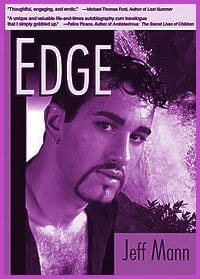As a high-school kid in rural West Virginia, US poet and teacher Jeff Mann hated sports, was razzed as a girly-boy by his peers and belonged to a clique of misfits nurtured by his lesbian biology teacher. He still hadn’t caught on. “I was the only person in Hinton High School who didn’t know I was queer.”
Young Jeff gained his first male role model from a novel, one that stirred his affinity for high drama. Wuthering Heights offered the archetypal outcast, Heathcliff. Mann identified immediately with Bronte’s gothic, brooding pariah. He reportedly spent the next 20 years yearning for “savage conflict, intensity and unmitigated passions.” Always seeking another Heathcliff, he fell hard for “one mistake after another.” The search rendered him “both perpetually unhappy and artistically productive.” The result: three prize-winning books of poetry in the last six years, and now this episodic memoir, part self-revelation, part travelogue.
Mann’s emotional life – freely shared – is a perpetual roller-coaster of gothic-romantic excess. Aside from his pubescent fixation on Victorian literature’s most hirsute, feral anti-hero, he was (and is) addicted to an old afternoon TV series called Dark Shadows, a cheesy gothic soap about a vampire with a sensitive heart and a disastrous love life.
Mann takes pride in his “complexity” and “ambiguity,” using these attributes to defend his disturbing position on the Southern Confederacy in the Civil War. He’s proud enough of the battlefield bravery of his “Confederate heroes” to claim them as the inspiration for attending his first gay protest march in Washington DC. The racial implications of that claim either elude him or he hopes they’ll elude us. Using the values of the racist Confederacy as a spur for gay activism is just moral and intellectual nonsense. It’s a slap in the face to all who’ve fought against American racism for the last 150 years.
Mann is aware of the shaky ground he thrives on, but seems unable to exorcise his buried demons. A long-term boyfriend eventually helps to tame them. “In summer of 1997, I meet a man who miraculously seems to love me despite my seething darkness, despite my odd enthusiasms, despite my conviction that I am secretly a monster.”
On a trip to Scotland, hairy men and clan history leave Mann torn between tumescence and dewy-eyed nostalgia for his heritage. Having just crossed the border from England to Scotland, he and a busload of seniors encounter shelves groaning with canned haggis and shortbread, and a kilted and sporraned piper installed on the lawn, playing Amazing Grace over and over. “Scottish culture laid on with a trowel.” Mann chokes up: “A transfixed fool… heart swelling with an odd mixture of joy and sorrow.” This section is finally the most moving in the book, as he skilfully links his ancestry with present sorrows in Virginia.
“Risks” takes us to Cambridge, England, where moments of peace beneath the vaulted ceiling of King’s College Chapel are merely a preamble to a torrid few days with a bearded Cambridge don. In Richard’s roomy College apartment they discuss Edward II and read poetry, then confess to a mutual interest in man sweat. Richard refines the concept: “Not a dirty reek, mind you, but that faint, tasty musk. Spicy. Rather like cumin.” Then he noses Mann’s hummy pit (“It had been, after all, a very hot day”) before slipping out to check on dinner. Dessert is an aromatic thrashabout in the sheets.
After a tour through the Bavarian haunts of King Ludwig II, we’re off on a whirlwind tour of Ireland. On a seaside cliff top at Inishmore, Mann inches on his belly toward the sheer drop, peers at the wave-battered rocks far below and imagines ending his midlife crisis with a dramatic leap. He notes the tiny orange lichens on the rocks just out of reach, and wonders at their strength. “Imagine a life which has learned to survive in the face of such a wind, always to front such a terrible immensity.” O brave little lichens!
Rapturous at his keyboard in Virginia, Mann recalls his mortal paroxysms on an Irish cliff: “My time to devour beauty will be as brief as any. I drop a pebble like a mineral scapegoat into the foaming sea below. Let the thorns continue to tighten about my heart. I am strong enough.” Backing carefully away from the edge, he comforts himself by caressing a fern.
Three trips to Key West form Mann’s closing salvo. With lover John, he manages to survive the sulky moods and body-image panic of turning 40. Mann freely admits that as a boyfriend, he’s a mercurial challenge. John emerges as the steady, devoted daddy who just might guide our tormented boy-man into a more mellow twilight.
EDGE.
By Jeff Mann.
Harrington Park Press.
183 pages. $24.95.

 Why you can trust Xtra
Why you can trust Xtra


